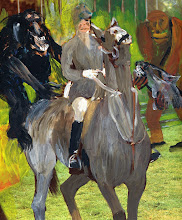27th November 20..
Dear P. S.,
Is this letter just another “flirt du mal”?
The kind they should forbid? But can they forbid it? Do they have the power to do so? Who are they anyway? Presumably some greats of society. But a “flirt du mal” doesn’t rebel against society. Consequently society can’t do anything to it. A “flirt du mal” rebels only against life. Against the extreme indignity of Being now. Hence the grand intellectual fable of modern life is pederasty. That broken pursuit of the ancient, never touching the classical.
A certain universality applies only if one uses this fable of pederasty to measure the value of all life including itself (Proust) but not when using all of life excluding itself to measure pederasty (Cocteau). Keeping in mind such distinctions are as vacuous as they are necessary.
Inversion even as a brutal fact is as mysterious as the throw of the dice. When all chance has been suspended - risk lies in the law of the favorite. Symmetry is the only uncertainty. The law of the favorite is both ancient and modern. Unlike horse racing, the favorite in the inverted world is the most unlucky. The higher the odds in your favor the unluckier you are. Antinous is the classic example. The precocious boy can seduce the man, the man can kill the boy. The earlier is crushed by the stronger. The boy dies but becomes the god of the man.
When inversion breaks loose turning quasi-metaphysical anywhere could become the scene of fatal lucklessness. Any object—its prop. So much of it is sleight-of-hand, now you see it, now you don’t, eventually a corpse, or a disappearance. The more unsentimental, technical or sudden, the better, Just like any accident. Thankfully, the lyrical romantic times of “‘Tristesse d’Olympio’ de la pédérastie” (Proust, Sodome et Gomorrhe II,III) are over.
Nothing is ever short enough or far enough not to be possessed by the inverted eye of the crowd. The inverted eye is satisfied only by mass collisions. The imagination is a second select mass. There the collisions are utterly disconnected from desire or appetite. But only if the imagination belongs to an artist. Only then does bad infinity—the imagined infinity of an incomplete series—switch to real infinity (infinitum actu) or present and positive existence of thought.
We are not bold in writing you this species of confession. Marooned solitaries acquire the habits of emperors or Scythians. It’s our desert island syndrome. We would say everything if we could. But we can’t. Not because we’re withholding anything. The very wish to say all makes it so hard not to taint what is said by what is left unsaid. We’ll be happy to create the impression of there being more even if there isn’t. Although it wouldn’t be a false impression. The glimmer of a surplus is the mute denial of a wrong prediction we made only to ourselves which was true once and could be true again.
The curse of Candaules pursues us—all members of the House of Gyges. The evil eye is our own orbit. Like Croesus we have all been fated to destroy a great empire—each one his own.
But are all of us truly members of that House? If you are you might be interested in comparing your case histories with ours. If you aren’t then no harm done.
Our theatre is actorless and motionless. Our dramas are the location of inaction, great force of will is expended to turn back will.
The ideal spectator would be tempted to seek ways of evading our mental and visual traps. We did too at first.
We would like to ‘know ourselves’ with Montaigne whom we love but instead we ‘pretend to know ourselves’ with Fernando Pessoa whom we don’t love. Self-awareness means not wanting to know more. Everywhere we look we discover sacrifices of a similar nature.
La Rochefoucauld had his amour-propre, we have our mauvaise foi. Our confessions of insincerity. These are our artistic emotions. Everything is allowed as long as it’s insincere. One should avoid sincerity in all things. Never be too sincerely insincere.
For years we resented the false emotions of others, until we realized they were our own and our best possessions.
The stronger the urge, the closer it comes to passion, the more treacherous it was, the higher its content of falsehood, so that we have processed ourselves into that desirable phantom in the center of all blind instinct, a will full of lies. Our Will is the Grand Lie of Being.
Fashion is most sincere. Born to die young, it sheds holy light from the start. But fashion has to wait until it’s thoroughly unfashionable for its true melancholy to shine. They don’t have to wait long. Whatever great work of art ever made you sad? What fashion didn’t? The same holds for the lives of the saints.
We’ve probably said all of this hundreds of times—but it comes to us now as if for the first time. The desirable phenomena are so short lived—the waxy gloss on the fruit—and the inferior defective ones so eternal and robust. This thought is as enduring as it is imprecise.
We cordially and gratefully leave all the rest if there should be any to your most analytical and corrosive imagination.
Best regards (…)

















.jpg)














No comments:
Post a Comment